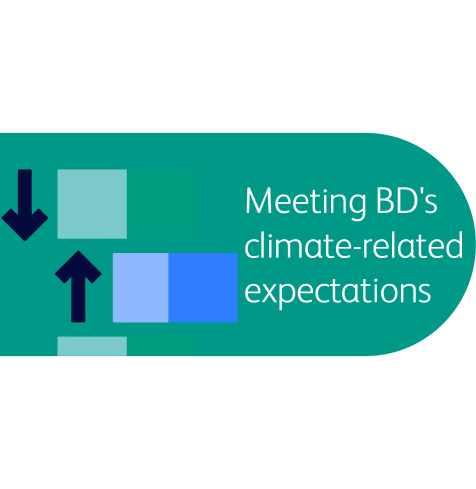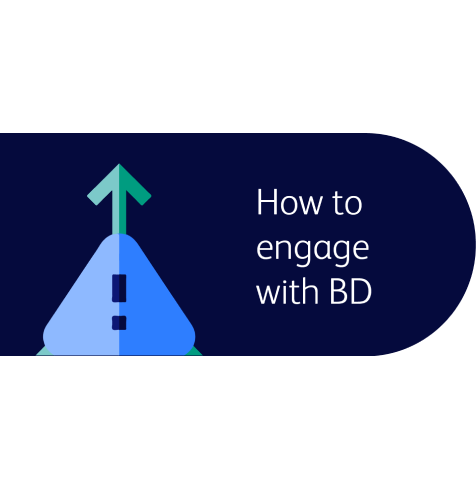The general contact email to Product Stewardship related questions is bd_moc@bd.com

As a signatory to the UN Race to Zero and the Science Based Targets Initiative (SBTi), BD is committed to reducing its emissions across its entire value chain (Find out more at https://investors.bd.com/esg/sustainability). A large share of our Greenhouse Gas (GHG) emissions are produced in our upstream supply chain, so we’re focusing on creating a supply chain that is adaptable to climate risks and able to contribute to strong environmental performance.
Our Climate Action Goal
Reduce Scope 1 and 2 emissions by 46% by 2030. And carbon neutral across direct operations by 2040. (Learn more about our 2030 Sustainability goals here)
As a part of our Scope 3 emissions reduction efforts, we are focused on reducing our emissions from Purchased Goods and Services and as part of this work we encourage our suppliers to set Science Based Targets initiative (SBTi) aligned targets by 2028 to reduce their emissions.
We can’t achieve our climate goals alone. To reach our goals we must seek new levels of collaboration with suppliers who are as ambitious around carbon reductions as we are. We ask our suppliers to disclose their carbon emissions data, set GHG targets in alignment with best practice, and bring ideas for sustainable products and services to BD. In the future, we will prioritize engagements with high impact suppliers who have set, or are committed to setting science-based aligned targets.

- Suppliers should systematically track, document, and publicly report all energy consumption and relevant Scope 1, 2 and 3 emissions (where applicable).
- Submit your emissions data to BD (contact BDResponsibleSourcing@bd.com to learn how)
- Set a target aligned with the Science Based Targets initiative (SBTi).
- Look for methods to minimize energy consumption and greenhouse gas emissions wherever possible.

- Review your company's current known impact and status on climate action and update strategy regularly.
- Map out your company's emissions (See resources below to learn how).
- Create a plan on how your company will set and achieve GHG targets.

- Make SBT aligned targets public through your company's website, annual report, SBTi website or CDP, and share GHG data with BD (contact BDResponsibleSourcing@bd.com to learn how).
- Measure and report progress to BD on an annual basis.
- Suppliers are encouraged to innovate around products and packaging to reduce emissions across their life cycle.
- Share product level GHG emissions data with BD

Learn more via these resources:
- Greenhouse Gas Protocol
- Science Based Targets Initiative (SBTi)
- Exponential Roadmap Initiative
- Carbon Disclosure Project (CDP)
- Ecovadis
- Pharmaceutical Supply Chain Initiative (PCSI)
Suppliers who wish to learn more about how they can share their emissions and reduction targets with BD, understand how they can start to reduce emissions, or engage further with BD on this topic can reach out to BDResponsibleSourcing@bd.com. While we share our minimum standards on emissions in our BD Expectations for Suppliers document, we are committed to collaborating across our supply chain to learn from, and share learnings with, suppliers of all levels of maturity on the emission reduction pathway.
Product Stewardship is an environmental management strategy BD employs that means whoever designs, produces, sells, or uses a product takes responsibility for minimizing the product's environmental impact throughout all stages of the products' life cycle, including end of life management. This approach helps BD to manage Materials of Concern, emerging packaging regulations, and other similar topics around waste and extended producer responsibility. Suppliers are asked to provide appropriate statements showing compliance with specific regulations/directives and/or to confirm the presence or specify the amount of substances used in products supplied to BD. You may be contacted via our data collection portal, or by a member of our Product Stewardship team.

Materials of Concern (MOC) are chemical substances for which a variety of regulations impose controls or bans or are of specific interest to our customers. These substances can pose a risk to human health and/or the environment. That is why BD makes every effort to understand the use of these substances in our supply chain. A full list of BD Materials of Concerns and more information about our Product Stewardship efforts and initiatives, including our iPoint data collection tools, can be found in the links below.

Conflict Minerals are known as 3TG (tin, tantalum, tungsten and gold) originating from defined Conflict Areas. BD investigates the country of origin of these minerals in the products which BD manufactures (or contracts to be manufactured) for which 3TG is necessary to the functionality or production of the product. BD expects its suppliers to cooperate with BD’s compliance efforts and to source responsibly, respect human rights, and not to contribute to conflict.

You may be contacted via our data collection portal or by a member of the product stewardship team about your products that BD uses as packaging or about packaging of your products if you supply finished goods that BD sells onward with no change to the packaging. We collect this data in order to be compliant with the EU Packaging and Packaging Waste Directive, the Model Toxics in Packaging Legislation from the US Toxics in Packaging Clearinghouse, and other similar extended producer responsibility (EPR) legislation worldwide. For more information about how to reply to BD’s packaging requests, you may contact epr@bd.com.